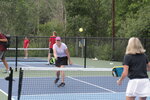







The Manchester Select Board this week tackled two big issues, including a big change in water rates based on recommendations from the about-to-be-dissolved Water Resources Protection Task Force and the drumbeat of complaints from neighbors within earshot of the popular Summer Street public pickleball courts.
First up, pickleball and the unintended consequences of the game’s ever-expanding popularity because of its accessibility, health benefits and fun.
The town redeveloped the former skateboard “park” area of Summer Street, across from Forest Street, constructing six pickleball courts surrounded by a chain-link fence that have been busy at all hours with players. And while they have been a hive of happy play, they’ve also been the source of neighbors complaining of continuous loud thumps that go along with the game.
Pickleball popularity has exploded nationally, so Manchester is not alone. Fans love it because it’s healthy, social, and fun, combining the concept of tennis with “ping-pong” table tennis. COVID was a huge accelerator for the sport, and towns that offer public courts like Manchester are a draw for devotees from far and wide.
But complaints from the constant noise from some neighbors began almost as soon as the Summer Street courts opened, with one neighbor even lodging a complaint with the Board of Health earlier this month connecting the noise to health concerns.
At MBTS’ Annual Town Meeting, voters approved $20,000 for sound mitigation of the courts from CPC funds, and the Manchester Recreation Committee’s Muffin Driscoll and Manchester Parks & Recreation Director Cheryl Marshall appeared before the Select Board to recommend raising the fence and installing sound barriers around three sides of the courts.
The market for sound-proofed pickleball equipment (racquets, balls, court infrastructure) is new and, not surprisingly, expanding rapidly. The Recreation Committee researched barrier vendors, spoke to neighbors and conducted sound research based on industry figures as well as measured sound at the Summer Street courts early in the morning when it was empty and again when it was fully being utilized.
The recommendation is a system combining a transparent barrier from SoundTec, a New Zealand company that would address neighbors’ aesthetic requests and offer line-of-site security assurance with non-transparent, high-performance side barriers along the Sweeney Park side of the courts. The total cost is $26,000.
Research into sound mitigation vendors has taken the better part of four months. USA Pickleball, an industry organization, helped source the vendor to offer Manchester a discount since the transparent barrier technology (long used in construction projects and to line racecar tracks) hasn’t yet been used for pickleball courts in Massachusetts.
“I know more than I knew a year ago, I’ll tell you that,” said Marshall.
Driscoll said the committee was “diligent” in addressing neighbors’ concerns and said Manchester is early in the game (pun intended) on adopting sound mitigation. Marshall said the challenge is balancing neighbor concerns with players who want to enjoy the public courts.
Kim Logue, one of the neighbors, told the SB that the noise has been hard to live with.
She said, “it looks like a fun game,” but there are times of the day when all the courts are being used, with upwards of 4,000 pops.
Logue said she’s not sure $26,000 will solve the problem.
The Select Board said it would vote on the measure in August.
A big part of Monday’s meeting addressed consideration of Manchester’s new water rate structure designed to curb water usage and get it closer to the state-recommended level of 65 gallons of water/person/day.
That’s a mouthful, but it’s the state standard and Manchester’s water usage exceeds that by 20% all year long and exceeds it wildly in the irrigation-heavy summer months. It also exceeds the Massachusetts per-person water consumption average of 50 gallons/person/day.
The MBTS Water Resources Protection Task Force recommended the new, five-tier rate system as part of its 18-month charter to research and recommend ways to protect Manchester’s municipal water system. They found that water levels are not threatened, and threats from contaminants like PFAS “forever chemicals” are real but can ultimately be managed (albeit expensively).
Last week, ahead of the SB’s annual setting of FY24 water rates, about 400 residents received notice that their homes were in the top 20 percent of the town’s water usage, and excluding changes in consumption, their rates in FY24 would be escalating. The recommended rate structure calls for a drop in rates for the lowest users and a dramatic escalation at the very top (which impacts less than 100 Manchester households).
Public comment pushed hardest against the idea that homes with large families would be disproportionately punished since the per-person goal of 65
gallons could be met by each house member while the Water Dept. single household meter would register them as a top-tier user household.
“That’s just simple math,” said Harris Komishane of Eagle Head.
Phil Furse of Blossom Lane agreed and equated the new rate structure to a second tax unfairly targeting the number of people in a house, not the efficiency of the overall household. He said real estate taxes are based on footprint, and that’s fair. This, he said, isn’t.
The Water Task Force responded that the approach is the fairest available since it’s unrealistic to price each person. Part of the task force’s recommendation is a move to smart water meters, which can push water consumption data and information to homes on
demand, updated in 15-minute increments. That would help.
Besides, said the task force’s chairman Steve Gang, the Massachusetts Dept. of Environmental Protection looks at average water consumption as it regulates the municipal water registration each year, so the overall goal is relevant, important, and requires action.
In the end, the Select Board decided to delay the implementation of the new rate system to January 2024. This will give the town time to send three communication notices to households to educate them on the new direction. It also gives the town time to refine the rates (including how to address the few, but important, commercial users which have not yet been done) and adjust if necessary, based on public feedback. The SB also said it would adopt a quarterly look at rates after adoption to get ahead of any issues that might arise.